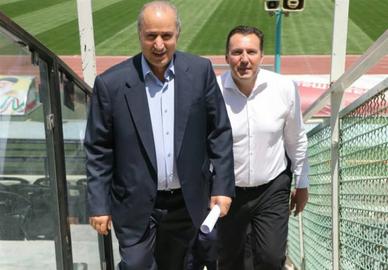The outgoing manager of Iran’s national football says he is still owed millions of dollars and has accused the Iranian Football Federation of breach of contract, but the corrupt official responsible for the deal is keeping a low profile, having resigned from his role on questionable medical grounds.
Marc Wilmots, who before his short stint as Iran’s head coach managed Belgium and Ivory Coast, resigned after less than a year in the job, accusing the federation of not honoring a number of clauses in his three-year contract.
The former head coach now claims that Iran must pay him €6 million as compensation. Mehdi Taj, who was the head of the Iranian Football Federation until the end of December, was responsible for bringing in Wilmots, and if the federation ends up meeting Wilmots’ demands, he will also be to blame for the enormous bill it will be forced to pay.
Wilmots resigned in an official email addressed to the international football federation FIFA just before Iran faced Iraq in a qualifying game for the World Cup. Writing to FIFA before returning to Belgium, he referred to clauses in his contract that up to that point had not been disclosed by the football federation or by members of the parliament.
Member of Parliament Ehsan Ghazizadeh Hashemi, a fierce critic of the football federation, went public with the shady nature of the coach’s contract on December 4, 2019, but it took Taj 25 days to resign, which he did on December 29, citing “medical reasons.” Some say he was forced to resign under pressure from watchdog bodies.
Suspicious Deal Struck in Brussels
It was mysterious that Wilmots ever became the head coach of Iran’s national team in the first place. His contract was suspicious, and did not follow normal procedures, involving Iran's National Petrochemical Company, Peyman Saadat, Iran’s ambassador to Belgium and Armin Uzunovic, Mark Wilmots’ Slovenian agent. The Iranian embassy in Belgium announced his appointment as coach before the media reported it. When asked why the contract with Wilmots was signed at the Iranian embassy in Belgium and after discussions with the ambassador, Mehdi Taj told the Iranian Students’ News Agency (ISNA): “I needed to do something at the embassy so I closed the contract there.”
At first, Mehdi Taj announced that the federation would be paying Wilmots $1.3 million per annum, but a short while later MP Ehsan Ghazizadeh Hashemi claimed that he had seen evidence that proved the contract was for an annual salary of €3 million, or close to US$3.3 million.
The amount was substantial, but that wasn't the only problem: the contract specified that regardless of whether the football federation canceled the contract or Wilmots terminated it unilaterally, the Iranian federation would still have to pay him three months of his salary. Based on this clause, even if Wilmots ended the contract in the last month of the last year of his work with the Iranian national team, Iran would still have to pay him for three extra months. Media outlets close to the Iranian Football Federation have claimed that Wilmots had received €2 million for managing the national team for seven months before he quit.
The contract also stated that Wilmots would receive 50 percent of the agreed figure before even coming to Iran, and stipulated that the contract could be terminated if the Iranian side did not pay the amount within three weeks of the specified date.
The corruption scandal comes at a time when Iranian football — and Iranian sports in general — is plagued by controversy.
After Iran was eliminated from the Asian Cup competitions and Carlos Queiroz left as the head coach of Iran’s national football team in early 2019, officials appeared to be in denial at the crises facing Iranian football. “We shall rise in greater glory! The greatest football coaches in the world are in line to negotiate with Iran,” Maziar Nazemi, the head of public relations for Iran’s sports ministry, famously tweeted.
In the same tweet, Nazemi named some of the great football coaches who, he said, were lining up to negotiate with Iran: Zinedine Zidane, current manager of Real Madrid, José Mario dos Santos, head coach of Tottenham Hotspur, Jürgen Klinsmann, manager of Hertha Berlin.
Now, a year on, and after the Supreme Leader announced in August 2019 that there was “no necessity” for foreign coaches in Iranian sports, the football federation is striving to find an Iranian manager among choices such as Amir Ghalenoei, Ali Daei and Vahid Hashemian.
The Numbers Game
The football federation told the media that Mark Wilmots would be a resident manager, and yet the contract only stated that he was committed to reside in Iran for at least 57 days a year. So, in reality, he did not have to be physically in Iran for more than 300 days over the contractual period and he would still be true to the contract.
If the football federation’s contract with Wilmots was worth $1.3 million a year, why was €2 million deposited into his account after he served only seven months as manager? The same media outlets report that Iran still owes Mark Wilmots €6 million.
Also, if the contract allowed Mark Wilmots to unilaterally cancel his contract, then why were there clauses in the contract giving him the power to demand the full amount of the contract to the last cent?
The Belgian website HLN and the German-based Transfermarkt have both estimated that Mark Wilmots costs around €900,000 per year. The Iranian Football Federation claimed that it had signed a contract with him for $1.3 million per year, although eventually it turned out that the real figure was €3 million. How did Mehdi Taj turn a coach who is worth €900,000 a year into a €3-million one?
In the world of football, as a general rule, when a footballer or coach is transferred, 10 percent of the contract amount goes to the person who has brokered the transfer, who is in this case Mehdi Taj. Of course, in many instances in Iranian football, transfer managers have received up to 80 percent of the contract for a footballer or a coach.
If Wilmots’ contract was for €900,000 per year, the broker fee would amount to €90,000, or €270,000 thousand for three years. But when Mehdi Taj signed a contract with Mark Wilmots for €3 million instead of €900,000 the management fee ballooned to €900,000 for three years. And this could be a conservative figure, because it is based on an agreed fee of 10 percent.
The same contract apparently allows Wilmots to demand the full amount of the contract if it is canceled by either side and the transfer manager receives his full 10 percent.
Now the most important questions arise: Where is Mehdi Taj? And what is the update on his mysterious illness?
Related Coverage:
Iranian Authorities Reduce Number of Tickets Sold Fearing Protests at Legendary Football Derby, 5 February 2020
Iran Plans to Avoid Israeli Athletes by Any Means Necessary, 4 February 2020
Insecurity for Iranians and non-Iranians is Hurting Sports Teams, 3 February 2020
Iran's Tae Kwon Do Olympic Medalist Claims Asylum in Germany, 24 January 2020
Faced with Repression at Home, Iranian Athletes Choose to Migrate, 13 January 2020
Foreign Sports Coaches Are Fleeing Iran, 9 January 2020
Iran's Football Manager May Quit After Six Months — Without Pay, 6 November 2019
The Man Behind Corruption and Embezzlement in Iranian Sports, 16 October 2019
Iranian Judo Federation Suspended — And Now all Iranian Sports are at Risk, 18 September 2019
Corruption, Lies, and Iran's Football Federation, 21 February 2019
IranWire Exclusive: Iranian Football’s Million-Dollar Swindle, 6 February 2019
visit the accountability section
In this section of Iran Wire, you can contact the officials and launch your campaign for various problems


























comments